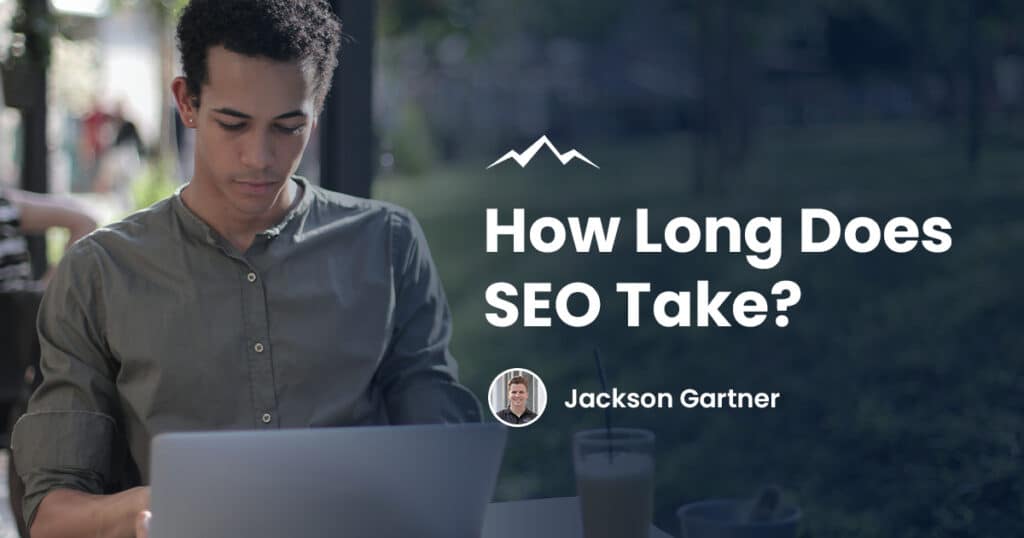SEO, or Search Engine Optimisation, is more like a marathon then a sprint.
So, how long does SEO take? In truth, SEO usually takes anywhere between 4 months to 1 year to yield substantial results, but this is highly contingent on various factors.
In this blog post, we take a look at the three primary influences on your SEO timelines: competition, backlinks, and content.
How Competition Impacts SEO Timelines
In the ever-evolving digital landscape, competition is fierce. When you’re competing for the top spot on search engines, it’s not just your business in the race but also countless others in your niche.
More competition often translates to a longer SEO timeline as strategies need to be continually refined and adapted.
Understanding the strength of your competitors is crucial. By analysing their online presence, you can glean insights into their keywords, backlinks, and content strategies.
However, developing a competitive analysis requires meticulous research, strategic thinking, and of course, time.
Tips To Outrank Your Competition
- Identify Your Real Competitors: Don’t just consider businesses offering the same products or services. Sometimes, your online competitors might be content websites, information sites, or even social media influencers.
- Analyse Their Strategies: Use tools such as SEMrush or Ahrefs to study your competitors’ keyword, backlink, and content strategies to see what got them to the top of page 1. This can offer valuable insights for your own SEO game.
How Backlinks Impact SEO Timelines
Backlinks, or links from other websites to your own, are an integral part of SEO. These serve as endorsements, vouching for your website’s credibility.
But, building a strong backlink profile isn’t a race; it’s a marathon. It’s not just about the volume of backlinks, but more importantly, about their quality and relevance.
Search engines favour a natural link growth pattern. Any sudden, unnatural influx of backlinks can appear suspicious and potentially attract penalties.
Therefore, creating a sustainable backlink strategy and fostering relationships with reputable sites should be a key part of your SEO plan.
For more on link spam, refer to Google’s guidelines.
Tips To Improve Your Website Backlinks
- Quality Over Quantity: Instead of focusing on the sheer number of backlinks, aim for high-quality backlinks from reputable websites in your niche.
- Natural Link Growth: It’s better to acquire backlinks gradually than all at once. Google might view a sudden surge in backlinks as unnatural and could penalise your site.
How Content Impacts SEO Timelines
Quality content forms the bedrock of any successful SEO strategy. Engaging and value-rich content not only serves to attract and retain users but also signals your website’s relevance to search engines.
Crafting such content necessitates a deep understanding of your audience’s needs, thorough keyword research, and regular content updates.
Building a catalogue of high-quality content takes considerable effort and time. But, rest assured, the fruits borne are worth the investment.
Tips To Create SEO Optimised Content
- Know Your Audience: Create content that resonates with your target audience. Use tools like Google Trends or Answer the Public to discover what they’re searching for.
- Update Regularly: Regularly updating your content keeps it fresh and relevant, which Google loves. It also gives visitors a reason to keep coming back.

What Does Google Say?
As per an analysis by Tim Soulo, just 5.7% of all newly published pages will reach Google’s top 10 within a year. SEO is an ongoing journey, a constant race where competitors old and new are always aiming for your spot.
Quicker Alternatives to SEO
While SEO is a crucial part of digital marketing, it is not the only game in town. There are faster alternatives that can bring immediate traffic and visibility to your website.
Pay-Per-Click (PPC) Advertising: Google Ads, a prominent PPC advertising platform, can help you reach your potential customers faster. With PPC, your ads appear in the sponsored section of search results, driving immediate traffic. However, this is an ongoing investment; once you stop paying, the traffic ceases.
Social Media Marketing: Social media platforms provide a dynamic and engaging way to connect with your audience. With the right strategy, you can boost your brand visibility and drive traffic to your site.
Email Marketing: A well-curated email list can be a gold mine. Direct communication with your audience can boost engagement, maintain relationships, and drive repeat traffic to your website.
Common SEO Mistakes to Avoid
As you embark on your SEO journey, it’s crucial to avoid common pitfalls that could delay results or harm your online reputation.
Keyword Stuffing: Overusing keywords can lead to a poor user experience and can penalise your site in search rankings. Remember, it’s about quality, not quantity.
Ignoring Website Design: A user-friendly, responsive website design is crucial for SEO. Google takes page experience into account when ranking sites, so a poorly designed site could harm your SEO efforts.
Creating Irrelevant Backlinks: Not all backlinks are created equal. Building irrelevant backlinks won’t boost your SEO and could even lead to penalties. It’s better to have fewer, high-quality backlinks than a plethora of irrelevant ones.
In Summary
Search Engine Optimisation is a long-term marketing strategy. On average, it takes at least 6 months to see meaningful results.
How long SEO takes hinges heavily on your competition, the quality and quantity of backlinks, and the value of the content on your site.
Although this might seem like a hefty time commitment, the sustainable growth and authority SEO builds over time are worth the investment.
If you’d like to find out more about SEO or work with our Brisbane SEO team on your website, please don’t hesitate to contact us today.
To your success,
Jackson




